Market Signals Summary:
The IBH stock market model is out of the market. The MAC stock market model is invested, the bond market model avoids high beta (long) bonds, the yield curve is steepening, the gold model is not invested, but the silver model is invested. The recession indicators COMP and iM-BCIg are both a bit higher from last week’s level. MAC-AU is also invested
Stock-markets:
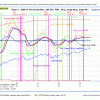 The IBH-model is out of the market as shown in Fig. 1. A sell signal was generated 15 weeks ago when the WLIg_shortEMA moved below the WLIg_longEMA. Currently the WLIg_shortEMA indicator is just below WLIg_longEMA. If the sell signal was correct then WLIg_shortEMA should move decisively below WLIg_longEMA.
The IBH-model is out of the market as shown in Fig. 1. A sell signal was generated 15 weeks ago when the WLIg_shortEMA moved below the WLIg_longEMA. Currently the WLIg_shortEMA indicator is just below WLIg_longEMA. If the sell signal was correct then WLIg_shortEMA should move decisively below WLIg_longEMA.
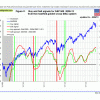 The MAC-US model stays invested. MAC-US Fig 2 shows the spreads of the moving averages, both lower from last week. A sell signals is not imminent. The sell spread (red graph) has to move below the zero line for a sell signal.
The MAC-US model stays invested. MAC-US Fig 2 shows the spreads of the moving averages, both lower from last week. A sell signals is not imminent. The sell spread (red graph) has to move below the zero line for a sell signal.
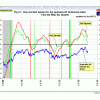 The MAC-AU model stays invested. MAC-AU Fig 2.1 shows the spreads of the moving averages of the Australia All Ordinaries Index, both of them lower from last week. The market may continue to move lower. The sell spread (red graph) has to move below the zero line for a sell signal. This model and its application is described in MAC-Australia: A Moving Average Crossover System for Superannuation Asset Allocations
The MAC-AU model stays invested. MAC-AU Fig 2.1 shows the spreads of the moving averages of the Australia All Ordinaries Index, both of them lower from last week. The market may continue to move lower. The sell spread (red graph) has to move below the zero line for a sell signal. This model and its application is described in MAC-Australia: A Moving Average Crossover System for Superannuation Asset Allocations
Bond-market:
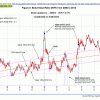 The BVR-model avoids high beta bonds (long-bonds) and also intermediate duration bonds.
The BVR-model avoids high beta bonds (long-bonds) and also intermediate duration bonds.
The Bond Value Ratio is shown in Fig 3. The BVR is a bit higher from last week’s level, with the overall trend continuing downwards. It will still take time for the lower offset line to be reached, so we can expect bond values to move lower for some time.
The Yield Curve:
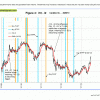 The yield curve model shows the steepening trend with the slope of the graph getting steeper. Figure 4 charts (i10 – i2). The trend is up, as one can see. FLAT and STPP are ETNs. STPP profits from a steepening yield curve and FLAT increases in value when the yield curve flattens. This model confirms the direction of the BVR.
The yield curve model shows the steepening trend with the slope of the graph getting steeper. Figure 4 charts (i10 – i2). The trend is up, as one can see. FLAT and STPP are ETNs. STPP profits from a steepening yield curve and FLAT increases in value when the yield curve flattens. This model confirms the direction of the BVR.
Recession:
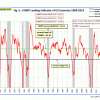 In Fig. 5 one can see that COMP is a bit lower from last week’s level, but it is far away from signaling recession. COMP can be used for stock market exit timing as discussed in this article The Use of Recession Indicators in Stock Market Timing.
In Fig. 5 one can see that COMP is a bit lower from last week’s level, but it is far away from signaling recession. COMP can be used for stock market exit timing as discussed in this article The Use of Recession Indicators in Stock Market Timing.
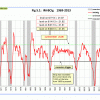 Fig. 5.1 shows our recession indicator iM-BCIg, which is also a bit higher than last week’s level. iM-BCIg has now reached a level which was only exceeded 7.1% of the time since 1969. A recession is not imminent as one can clearly see.
Fig. 5.1 shows our recession indicator iM-BCIg, which is also a bit higher than last week’s level. iM-BCIg has now reached a level which was only exceeded 7.1% of the time since 1969. A recession is not imminent as one can clearly see.
Please also refer to the BCI page
Gold:
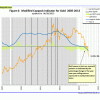 There is no buy-signal from the modified Coppock Gold indicator shown in Fig 6. This model has been out of Gold since Nov-26-2012. Gold would have to make a sustained move to $1700 and higher over the next few weeks for a buy signal according to my projections. This seems highly unlikely in view of the recent price decline. This indicator is described in Is it Time to Buy Gold Again? – Wait for the buy signal …….
There is no buy-signal from the modified Coppock Gold indicator shown in Fig 6. This model has been out of Gold since Nov-26-2012. Gold would have to make a sustained move to $1700 and higher over the next few weeks for a buy signal according to my projections. This seems highly unlikely in view of the recent price decline. This indicator is described in Is it Time to Buy Gold Again? – Wait for the buy signal …….
Silver:
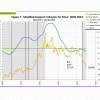 There was a buy-signal recently from the modified Coppock Silver indicator shown in Fig 7. The current price (Friday’s London fix) is a lot lower than the buy price. This indicator is described in Silver – Better Than Gold: A Modified Coppock Indicator for Silver
There was a buy-signal recently from the modified Coppock Silver indicator shown in Fig 7. The current price (Friday’s London fix) is a lot lower than the buy price. This indicator is described in Silver – Better Than Gold: A Modified Coppock Indicator for Silver

Leave a Reply
You must be logged in to post a comment.